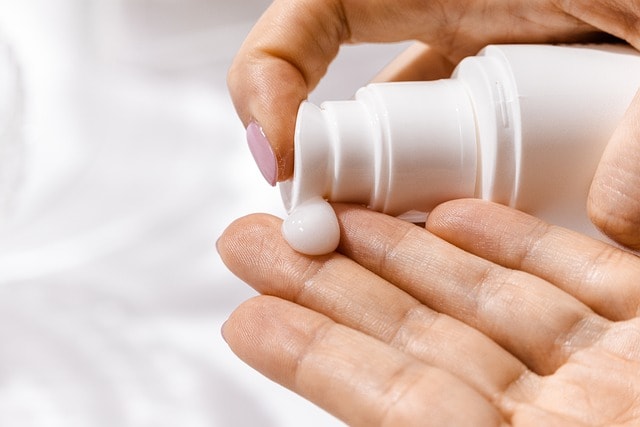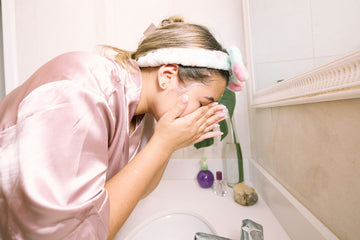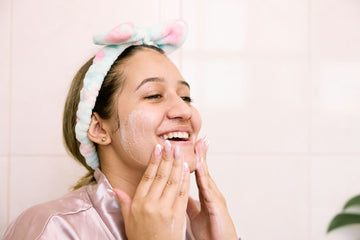A well-crafted skincare routine is essential for maintaining healthy, glowing skin. But with so many products and skincare trends, it can be overwhelming to know where to start.
Whether you’re dealing with dryness, acne, or the effects of aging, building a personalized skincare routine that targets your specific needs is key.
In this guide, we’ll explore expert tips and essential steps to help you create a top-notch skincare routine.

Understanding Your Skin
Before you can create the perfect skincare routine, it’s important to understand your skin and its unique needs.
What Causes Dry Skin?
Dry winter skin can be a common concern, particularly during colder months or in dry climates. Low humidity, cold temperatures, and indoor heating can strip your skin of its natural moisture, leading to dryness.
Dehydrated skin often feels tight, dull, and uncomfortable. Combatting dry skin requires a focus on hydration and gentle products that protect the skin’s natural barrier. With the right skincare products, you can set yourself up for success with healthy and radiant skin.
Skin Types and Concerns
Skin types are primarily determined by genetics, but they can be managed with the right skincare routine. The most common skin types include:
-
Dry Skin: Lacks moisture and often feels tight or rough.
-
Oily Skin: Produces excess oil, particularly in the T-zone, leading to shininess and enlarged pores.
-
Combination Skin: A mix of dry and oily areas, usually oily in the T-zone and dry on the cheeks.
-
Sensitive Skin: Prone to redness and irritation, requiring gentle, fragrance-free products.
Common skin concerns such as acne, large pores, dark spots, fine lines, wrinkles, and hyperpigmentation can be addressed with targeted treatments.
Sensitive skin, in particular, needs careful attention and gentle, non-irritating ingredients to avoid exacerbating issues.
Understanding Skin pH and Its Importance
Maintaining a healthy skin pH is crucial for an effective skincare routine, especially during the winter months. Skin pH refers to the level of acidity or alkalinity on the skin’s surface, with a healthy skin pH being slightly acidic, ranging from 4.5 to 5.5. When the skin’s pH is out of balance, it can lead to dryness, irritation, and other skin concerns.
Using products that are too harsh or alkaline can disrupt the skin’s natural pH, leading to dryness and irritation. Conversely, products that are too acidic can cause irritation and redness. It’s essential to choose products that are formulated to work in harmony with the skin’s natural pH.
In the winter, the skin’s pH can become more alkaline due to the dry air and harsh winds. To combat this, incorporate products rich in hyaluronic acid, ceramides, and niacinamide into your routine.
These ingredients help to restore the skin’s natural pH and retain moisture, ensuring your skin remains balanced and hydrated during the colder months.

Essential Skincare Steps
No matter your skin type or concerns, the foundation of any skincare routine includes a few essential steps.
Cleanse
Cleansing is the first and most crucial step in any skincare routine. It removes dirt, oil, and impurities that accumulate on the skin throughout the day. Start with a gentle cleanse, particularly during winter, using a sulfate-free cleanser that won’t strip your skin of its natural oils.
-
Use warm water, as hot water can be too harsh and dehydrate your skin.
-
If you have dry skin, opt for a creamy or milk-based cleanser to maintain moisture.
For those with oily or acne-prone skin, a gel or foaming cleanser may be more effective in controlling oil production.
Exfoliate: Remove Dead Skin Cells
Remove dead skin cells to encourage healthy skin cell turnover and help with pore congestion.
-
Exfoliate one to two times a week, depending on your skin type. Dry or sensitive skin should exfoliate less frequently, while oily skin can handle more regular exfoliation.
-
Use a gentle exfoliant, such as a chemical exfoliant (like AHAs or BHAs), or a physical exfoliant with fine, round beads.
-
Avoid over-exfoliating, as it can lead to irritation and dryness.
Regular exfoliation ensures that your skin remains smooth and radiant by clearing away buildup.
Treat: Serums, Concentrates, or Facial Oils
Serums are lightweight, highly concentrated treatments that target specific skin concerns like hydration, brightness, or fine lines.
-
Use a hydrating serum to draw moisture into the deeper layers of your skin. Ingredients like hyaluronic acid are excellent for boosting hydration.
-
For anti-aging benefits, look for serums with vitamin C or other antioxidants that help brighten and protect the skin from environmental stressors.
Applying a serum after cleansing and before moisturizing ensures that the active ingredients penetrate deeply into the skin.

Moisturize
Moisturizing is essential for locking in hydration and protecting the skin’s moisture barrier.
-
For dry or sensitive skin, choose a rich, emollient moisturizer to soothe and calm the skin.
-
Oily or combination skin can benefit from lighter, oil-free moisturizers that hydrate without clogging pores.
Look for moisturizers with ingredients like ceramides, glycerin, or a skin barrier repair complex to help retain moisture and strengthen the skin’s natural defenses.
For extra moisture and nourishment, consider using honey-infused body oil, especially on damp skin, to enhance absorption.
Eye Care
The delicate skin around the eyes requires special care, as it’s often the first area to show signs of aging and dull skin.
-
Use an eye cream twice a day to maintain the health and elasticity of this sensitive area.
-
Look for eye creams with ingredients like caffeine (to reduce puffiness), peptides (to strengthen the skin), and hyaluronic acid (to hydrate and plump).
Regular application of eye cream can help reduce the appearance of fine lines, wrinkles, dark circles, and puffiness.
Protect: Sunscreen/SPF
Sunscreen is one of the most important steps in any skincare routine, as it protects your skin from damaging UV rays that contribute to premature aging and skin cancer.
-
Use a broad-spectrum sunscreen with an SPF of at least 30 daily, even on cloudy days.
-
Apply sunscreen 15 to 30 minutes before going outside to ensure your skin is fully protected.
Daily use of sunscreen helps prevent sun damage, fine lines, hyperpigmentation, and more.

Winter Skincare Routine
Cold weather can wreak havoc on your skin, leading to dryness, flakiness, and irritation. Adjusting your winter skincare routine can help combat these issues.
Winter weather exacerbates skin problems due to low humidity and indoor heating, which strip moisture from the skin.
To combat these effects, consider using heavier moisturizers, cleansing oils, and beauty balms to maintain skin hydration during this challenging season.
Adjusting Your Routine for Winter
-
Use richer, more hydrating formulas during the winter months as part of your care routine for winter.
-
Reduce the frequency of exfoliation to avoid over-drying your skin. Incorporate routine tips for healthy skin by using gentle, hydrating products.
-
Look for a calming cleanser that won’t strip away essential oils.
Ingredients like hyaluronic acid, ceramides, and niacinamide are ideal for supporting the skin barrier and retaining moisture in colder, drier conditions.
Additionally, consider skincare routine tips specifically tailored for winter, such as using targeted body care products to combat dryness caused by lower humidity.
Managing Dry Skin in Winter
If you struggle with dry skin during winter, incorporating a hydrating face oil into your routine can help lock in moisture and soothe irritation. Chapped lips are another common issue during winter, often caused by cold weather and low humidity.
To prevent and treat chapped lips, use specific lip balms and exfoliating techniques to restore moisture and softness.
-
Use a honey-infused face oil to nourish your skin and apply it to your neck and décolletage for extra hydration. The combination of dull skin and chapped lips is a frequent problem due to winter conditions, with low humidity and indoor heating contributing to moisture loss.
-
For the body, opt for a rich body oil packed with vitamins and fatty acids to revive dry, tight skin. To combat dryness and chapped conditions, follow a routine for soft lips: gently exfoliate with honey and sugar to remove flaky skin, then apply a nourishing lip oil to hydrate and protect your lips from harsh elements.
These products can help maintain hydration and restore your skin’s natural glow.

Customizing Your Skincare Routine
Not all products work for every skin type, so customizing your skincare routine to meet your specific needs is crucial.
Product Selection for Sensitive Skin
For those with sensitive skin, choosing the right products is essential for avoiding irritation.
-
Select products that are fragrance-free, hypoallergenic, and gentle.
-
Avoid harsh ingredients like sulfates, artificial fragrances, or dyes, which can exacerbate sensitivity.
Look for soothing ingredients such as aloe vera, green tea, and chamomile to calm and protect the skin.
Addressing Specific Skin Concerns
If you have particular skin concerns, such as acne or aging, incorporating targeted treatments can make all the difference.
-
For acne-prone skin, use spot treatments with salicylic acid or benzoyl peroxide to reduce breakouts.
-
To reduce fine lines and wrinkles, look for products with retinol or peptides.
-
For brightening and evening out skin tone, niacinamide and vitamin C are excellent choices.

Additional Tips and Essentials
Your skincare routine doesn’t end with the basics. Incorporating additional treatments and tips can take your routine to the next level.
During winter, consider adding tips for healthy, hydrated skin, such as using a humidifier, applying a thicker moisturizer, and drinking plenty of water to combat dryness and chapped lips.
How to Relieve Redness
If you experience redness, use products with calming ingredients like aloe vera, green tea, or chamomile. Avoid harsh ingredients that may cause further irritation, and opt for products with hyaluronic acid or ceramides to help soothe and protect the skin.
How to Add Extra Moisture
For extra hydration, incorporate a hydrating serum or moisturizing face mask into your routine once or twice a week.
-
Look for masks with honey or glycerin to retain moisture and provide a soothing treatment for dry or stressed skin.
The Role of Diet in Skincare
A healthy diet plays a crucial role in maintaining healthy, hydrated skin, especially during the winter months. Consuming a diet rich in fruits, vegetables, whole grains, and lean proteins provides the skin with the necessary nutrients to stay healthy and hydrated.
Foods high in antioxidants, such as berries, leafy greens, and nuts, help protect the skin from environmental stressors and promote collagen production. Omega-3 fatty acids, found in fatty fish, flaxseeds, and walnuts, reduce inflammation and support healthy skin.
Staying hydrated is equally important. Drinking plenty of water throughout the day helps flush out toxins and keeps the skin hydrated from the inside out. Incorporating foods rich in vitamin C, such as citrus fruits, bell peppers, and broccoli, boosts collagen production and improves skin texture. Foods high in zinc, like oysters, beef, and chicken, reduce inflammation and promote wound healing.
By maintaining a healthy diet and staying hydrated, you can support your skincare routine and keep your skin healthy and hydrated throughout the winter months.
Building a Top-Notch Skincare Routine: Expert Tips and Essentials Conclusion
Building a top-notch skincare routine starts with understanding your skin type and concerns.
By incorporating essential steps like cleansing, moisturizing, and using SPF, along with targeted treatments and seasonal adjustments, you can create a routine that keeps your skin healthy, radiant, and resilient.
Consistency is key—follow these expert tips, and you’ll be well on your way to achieving your skincare goals.






